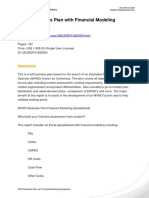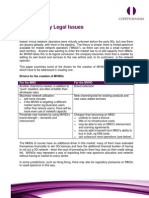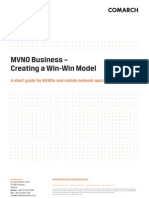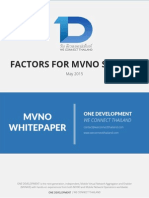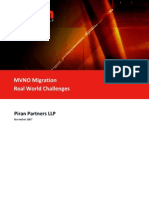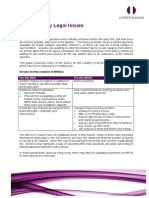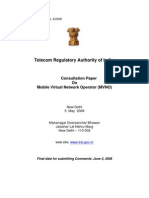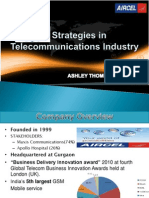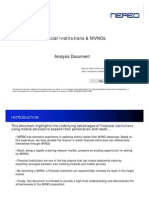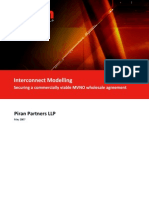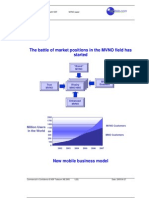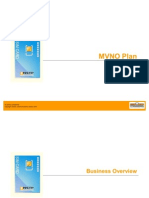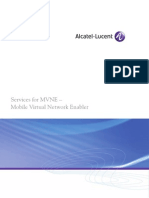0 ratings0% found this document useful (0 votes)
129 viewsMobile Virtual Network Operator
Mobile Virtual Network Operator
Uploaded by
faiz_grwThis document discusses the Mobile Virtual Network Operator (MVNO) concept. It provides the following key points:
- MVNOs allow new entrants to focus on services, content, branding and marketing by reducing infrastructure requirements and relying on a host network operator for radio access. This lowers barriers to entry compared to full mobile operators.
- MVNOs can address underserved market segments or differentiate through unique value propositions. They provide benefits to host operators by accessing new customers and markets.
- The document outlines different MVNO business models and factors for success, such as the relationship with the host operator and focus on complementary strengths. It also describes the consultant's approach to advising clients on MVNO strategy
Copyright:
© All Rights Reserved
Available Formats
Download as PDF, TXT or read online from Scribd
Mobile Virtual Network Operator
Mobile Virtual Network Operator
Uploaded by
faiz_grw0 ratings0% found this document useful (0 votes)
129 views8 pagesThis document discusses the Mobile Virtual Network Operator (MVNO) concept. It provides the following key points:
- MVNOs allow new entrants to focus on services, content, branding and marketing by reducing infrastructure requirements and relying on a host network operator for radio access. This lowers barriers to entry compared to full mobile operators.
- MVNOs can address underserved market segments or differentiate through unique value propositions. They provide benefits to host operators by accessing new customers and markets.
- The document outlines different MVNO business models and factors for success, such as the relationship with the host operator and focus on complementary strengths. It also describes the consultant's approach to advising clients on MVNO strategy
Original Description:
MVNO Business Model
Copyright
© © All Rights Reserved
Available Formats
PDF, TXT or read online from Scribd
Share this document
Did you find this document useful?
Is this content inappropriate?
This document discusses the Mobile Virtual Network Operator (MVNO) concept. It provides the following key points:
- MVNOs allow new entrants to focus on services, content, branding and marketing by reducing infrastructure requirements and relying on a host network operator for radio access. This lowers barriers to entry compared to full mobile operators.
- MVNOs can address underserved market segments or differentiate through unique value propositions. They provide benefits to host operators by accessing new customers and markets.
- The document outlines different MVNO business models and factors for success, such as the relationship with the host operator and focus on complementary strengths. It also describes the consultant's approach to advising clients on MVNO strategy
Copyright:
© All Rights Reserved
Available Formats
Download as PDF, TXT or read online from Scribd
Download as pdf or txt
0 ratings0% found this document useful (0 votes)
129 views8 pagesMobile Virtual Network Operator
Mobile Virtual Network Operator
Uploaded by
faiz_grwThis document discusses the Mobile Virtual Network Operator (MVNO) concept. It provides the following key points:
- MVNOs allow new entrants to focus on services, content, branding and marketing by reducing infrastructure requirements and relying on a host network operator for radio access. This lowers barriers to entry compared to full mobile operators.
- MVNOs can address underserved market segments or differentiate through unique value propositions. They provide benefits to host operators by accessing new customers and markets.
- The document outlines different MVNO business models and factors for success, such as the relationship with the host operator and focus on complementary strengths. It also describes the consultant's approach to advising clients on MVNO strategy
Copyright:
© All Rights Reserved
Available Formats
Download as PDF, TXT or read online from Scribd
Download as pdf or txt
You are on page 1of 8
Mobile Virtual Network Operator
Mobile Virtual Network Enabler
Innovation Services
Strategy and Marketing
WHATS IT ALL ABOUT?
Seemingly saturated markets, increasing competi-
tion and higher end-user expectations with regard to
quality-of-service (QoS) and innovation along with
greater sophistication and heterogeneity/diversity in
terms of end-user service and content demand are
the current market challenges facing todays operators.
While experiencing cost pressures, ever-increasing
technological complexity and shortage of skills and
resources, they need to identify new ways of real differ-
entiation and unique value proposition, outperforming
their competitors on time-to-market.
Currently, the telco business paradigm is shifting away
from full vertical integration of the operators value
chain towards a higher degree of specialization. Spe-
cialists, turning away from mere coverage and capac-
ity provision and focusing solely on end-user service
development, content, branding, marketing and sales,
are emerging. The latter are often companies with a
strong brand and consumer focus against a media or
content background.
The Mobile Virtual Network Operator (MVNO) concept
is a very attractive option for such a specialist,
aiming at drastically reducing the required resources
(investment, headcount and roll-out time) and allowing
the new entrant to focus on the really critical, market-
side success factors. As there is no need for a spec-
trum licence, a lengthy, complex and expensive radio
network roll-out, or ongoing maintenance of the latter,
market entry barriers are much lower than for a full
mobile network operator (MNO).
On the other side of the coin, dependency on external,
potentially competing, parties increases, thus necessi-
tating complex contractual agreements and governance
models. Infrastructure and services suppliers are
working on Mobile Virtual Network Enabler (MVNE) of-
ferings, intended to make optimal use of a host mobile
network operators (host MNOs) spare capacity, while
simultaneously providing sound governance models to
the MVNO.
In our MVNO consulting package, we advise our
clients on the strategic, technical and commercial
implications of the MVNO business model, create all
necessary blueprints, support them in negotiating
fair terms and conditions with a host MNO, as well as
accompanying them through the implementation and
commercial launch. With respect to suppliers, we pro-
vide advice on how to successfully implement MVNE
business models.
Strategy and Marketing
Host MNO value added MVNO value added
Applications &
Services
Radio
Access
Network
Routing
Inter-
connection
Customer
Care
Billing &
Collection
Handset
Management
Marketing &
Sales
Full
MVNO
Applications &
Services
Radio
Access
Network
Routing
Inter-
connection
Customer
Care
Billing &
Collection
Handset
Management
Marketing &
Sales
Light
MVNO
Applications &
Services
Radio
Access
Network
Routing
Inter-
connection
Customer
Care
Billing &
Collection
Handset
Management
Marketing &
Sales
Second
Brand
Applications &
Services
Radio
Access
Network
Routing
Inter-
connection
Customer
Care
Billing &
Collection
Handset
Management
Marketing &
Sales
Branded
Reseller
Applications &
Services
Radio
Access
Network
Routing
Inter-
connection
Customer
Care
Billing &
Collection
Handset
Management
Marketing &
Sales
MNO
M
V
N
O
Variants of the MVNO business model
For an MNO, opening its mobile network to MVNOs
makes sense if:
the MNO subscriber growth is limited due to mar-
ket saturation, or market share is stale/decreasing;
the MVNO addresses market segments that are
currently underpenetrated by the MNO (or not
addressed at all);
the MVNO succeeds in addressing market seg-
ments at lower cost than the MNO;
the MVNO does not compete on low price, but
instead on content or brand;
the MNO churn rate is high, so it is preferred that
customers leave to go to an MVNO partner rather
than another MNO (as the host MNO would still
carry the trafc);
a large amount of capacity is available in the radio
access network (e.g. market-follower MNO).
Analyst consensus is that MVNOs are likely to grab
10% to 20% market share in the long run. From an
individual MVNOs point of view, success depends on
the quality of the relationship or interface between the
MVNO and the host MNO under strategic and opera-
tional, commercial and technical, contractual and
human aspects:
The MVNO management team must have a clear
focus and expertise on and in service and content
creation, branding, marketing and sales.
The MVNO should follow a strategy and emphasize
strengths that complement the MNO core business
rather than attempting a frontal attack.
The MNO network strategy must be consistent with
the MVNO product offering (e.g. coverage, high
quality-of-service levels, broadband features).
A robust change management mechanism must
be established with the MNO, including price and
network services adjustments in particular; it is
MVNO CONCEPT
An MVNO provides mobile services to end-users
without owning its own frequency spectrum, a radio
access network (RAN) and backhaul network, as it
buys such capacity from a host MNO. The MVNO may
or may not own core network assets such as home
location register (HLR), mobile switching centre (MSC)
and gateway GPRS support node (GGSN) but its
essential network assets are a service delivery platform
and a business support system (BSS) for customer re-
lationship management (CRM) and billing. The degree
of freedom available to the MVNO to differentiate itself
via innovative services and pricing depends on the
breadth of the core network platform it operates and
the agreements contracted with the host MNO.
Also commonly handled within the MVNO framework
are second brands of incumbent MNOs and brand-
ed resellers that resell an MNOs products and serv-
ices under their own brand and are essentially a spe-
cialized marketing and sales channel.
Market maturity and diverse customer needs make the
MVNO a very promising concept. The value of MVNOs
to host-MNOs stems from:
the strength of their brand and marketing;
their innovative sales channels and distribution
network;
their market intelligence contributing towards iden-
tifying and serving the fty to a few hundred customer
segments known to todays sophisticated markets
and their ability to target specic customer segments
at a lower cost than the incumbent MNO.
MVNOs strategically position themselves rstly as ei-
ther offering differentiated services, bundles, conven-
ience and service excellence or providing no frills
basic voice service as a value proposition and, second-
ly, as either serving the mass market or a niche market
(e.g. minorities) as their target market.
Innovation Services
essential to buy bulk capacity at a reasonable price
and have a mechanism for dynamic price and
volume adjustments.
A comprehensive contractual framework has to be
put in place, covering not only service rendered
and pricing, but also such details as end-user
ownership and exit terms.
The personal relationship between the various
hierarchical levels of MNO and MVNO staff is of
paramount importance.
The capability of sourcing mobile handsets at
competitive conditions is an important feature in
many markets (where handsets are sold and subsi-
dized via operators sales channels), a partner for
handset sourcing may therefore be needed.
OUR APPROACH
By drawing on the resources of a team that pioneered
the MVNE business concept at a leading infrastruc-
ture and services supplier, we have ample experience
with regard to all strategic and operational aspects of
various MVNO business models and cover all func-
tional areas ranging from technology, via network
architecture/operations and process/interface design to
the commercial and contractual topics governing the
relationship between MVNO and host MNO.
We employ a modular three-phase approach, the start
of each phase being determined by successful comple-
tion of one of the following project milestones:
Kick-off workshop:
This multiple-day session is intended to create a
common understanding about the MVNO concept
and the available options, as well as the respective
pros and cons, with the client, in order to enter
the conceptual strategy and business plan blue-
printing phase.
Go/no-go decision:
Managements decision to further pursue the
MVNO project, after reviewing its strategic options,
nancial projections and risks, is a prerequisite for
Strategy and Marketing
Our architectural blueprint for a full MVNO
MVNO Host MNO
Fulfillment
Billing
SIM Card
Management
Handset
Management
Provisioning
Service Delivery Platform (SDP)
Content Platform
Music Video Game ...
MMSC SMSC VMSC
Info
Glossary
GGSN Gateway GPRS Support Node
GMSC Gateway Mobile Switching Centre
GPRS General Packet Radio Service
HLR Home Location Register
MMSC Multimedia Messaging Service Centre
MSC Mobile Switching Centre
PLMN Public Land Mobile Network
PSTN Public Switched Telephone Network
RAN Radio Access Network
SGSN Serving GPRS Support Node
SMSC Short Message Service Centre
VMSC Voice Mail Service Centre
SGSN GGSN
HLR
RAN
Host MNO Points of Interface (POI)
PLMN PSTN
MVNO Points of Interface (POI)
PLMN PSTN
GGSN
...
MVNO
Operation, Administration and Maintenance
(OAM)
Operation, Administration and Maintenance
(OAM)
Customer Relationship Management
(CRM)
MSC MSC
GMSC
Firewall
Internet
MSC
HLR
Internet
Host
MNO
GMSC
Firewall
entering phase two, where the platform is designed
in detail, sourcing requirements and criteria are
dened, and suppliers offers are solicited and
evaluated.
Buy decision:
The buy decisions leads to contract signature with
the suppliers and triggers the third and nal phase
of implementation and launch.
Commercial launch:
The commercial launch marks the end of our
involvement, as our client turns to steady-state
MVNO operations.
The three modules, as presented in our graphical
MVNO consulting package overview, are described
below in more detail.
Strategy and Business Plan Module:
This module comprises a feasibility study, taking
into account the competitive environment and
market forecasts, as well as the strengths and
weaknesses of the prospective MVNO. Regulatory
Innovation Services
constraints are also considered. International MVNO
case studies from our knowledge base can be used
to illustrate the key concepts. Upfront contacts with
the addressable MNOs in the market help to pre-
assess the potentials of a host MNO agreement.
We present alternative market entry strategies, as
well as the technical and operational MVNO solu-
tions available to our clients, to help them make the
right decision at an early stage.
Finally, blueprints are created for all functional
areas: draft business plan, risk assessment, sales/
distribution concept, network architecture concept,
operations concept, sourcing concept, content busi-
ness concept and key requirement specications.
Platform Design and Supplier Selection Module:
Using the concepts and requirement specications
from the blueprinting phase, supplier offers are
solicited and evaluated. This comprises RfI, RfP and
RfQ support.
Partner selection with regard to the host MNO in-
cludes contract negotiation support and is paralleled
Our architectural blueprint for a light MVNO
Host MNO MVNO
Fulfillment
Operation, Administration and Maintenance
(OAM)
Operation, Administration and Maintenance
(OAM)
Billing
Customer Relationship Management
(CRM)
SIM Card
Management
Handset
Management
Provisioning
Service Delivery Platform (SDP)
Content Platform
Music Video Game ...
MMSC SMSC VMSC
Info
SGSN GGSN
HLR
RAN
Host MNO Points of Interface (POI)
PLMN PSTN
MVNO Points of Interface (POI)
PLMN PSTN
GGSN
...
MVNO
MSC MSC
GMSC
Firewall
Internet
MSC
HLR
Internet
Host
MNO
GMSC
Firewall
Glossary
GGSN Gateway GPRS Support Node
GMSC Gateway Mobile Switching Centre
GPRS General Packet Radio Service
HLR Home Location Register
MMSC Multimedia Messaging Service Centre
MSC Mobile Switching Centre
PLMN Public Land Mobile Network
PSTN Public Switched Telephone Network
RAN Radio Access Network
SGSN Serving GPRS Support Node
SMSC Short Message Service Centre
VMSC Voice Mail Service Centre
Strategy and Marketing
business, both technically and operationally. This
includes provision of assistance in the organizational
setup and creation of reporting structures, in rolling
out the network components and initiating opera-
tions, in eld trials, in the integration of the content
platform and in the implementation of the immedi-
ate going-to-market strategy measures.
Our job is completed once the network is up and
running and successfully commercially launched.
CLIENT BENEFITS
MVNO aspirants benet from a thorough upfront
screening of the chances for success of an MVNO
business in the target market, as well as of the project-
ed nancials and the associated risks. We recommend
promising approaches and strategies and investigate
the market for potential MNOs right from the start.
by the design of a workable governance model. If
applicable, we also assist in negotiations with the
regulator.
Partner management also plays an important role
in content acquisition, and we support the relevant
concept design and negotiations.
Strategy, business plan, content concept, as well
as architecture and operations concepts are then
ne-tuned and supplemented by inputs from host
MNO agreements, content provider and sourcing
contracts. The precise denition of service level a-
greements (SLA) is a major part of operations
concept detailing and contract negotiation. Finally,
sufcient testing is performed to obtain reasonable
assurance of the workability and practical perform-
ance to be expected.
Implementation and Launch Module:
We accompany our clients in setting up their MVNO
Business Process Framework (eTOM)
Enterprise Management
Financial & Asset
Management
Stakeholder & External
Relations Management
Human Resources
Management
Strategic & Enterprise
Planning
Enterprice Risk
Management
Enterprise Effectiveness
Management
Knowledge & Research
Management
Operations
Support &
Readiness
Fulllment Assurance Billing &
Revenue
Management
Operations
Costumer Relationship Management
Service Management & Operations
Resource Management & Operations
Supplier/Partner Relationship Management
Strategy, Infrastructure & Product
Strategy &
Commit
Infrastructure
Lifecycle
Management
Product
Lifecycle
Management
Marketing & Offer Management
Service Development & Management
Resource Development & Management
Supply Chain Development & Management
Clients receive strategy and business plan blueprints,
architectural and operational concepts, as well as re-
quirement specications as a basis for a substantiated
go/no-go management decision.
Furthermore, we use our expertise to achieve better
results for our clients in negotiating the terms and
conditions with host MNO, content partners and sup-
pliers.
After nalizing strategy, business plan, technical
architecture and operational concepts for all func-
tional areas, we assist the client in rolling out the
MVNO business up to and including commercial
launch, thus ensuring a smooth implementation.
Innovation Services
Strategy,
commercial
and contracts
workstream
Market forecast and pricing
Regulatory aspects
Negotiations with MNOs
Draft business plan
Risk assessment
Sales/distribution concept
RfP/RfQ commercial lead
Partner selection
Governance concepts
Contracts nalization, incl.
content contracts
Final business plan
Contracts sign-off
Setup of reporting and
controlling organization
Market campaign
implementation
Network concept
Operations concept
Assessment of existing
OSS environment
Sourcing concept
Requirements specication
RfP/RfQ tech. support
Rene operations concept
with suppliers, incl. SLA
Acceptance and inter-
operability tests
Budget planning
Implementation roadmap
Implementation of network
components, OSS/BSS
and connectivity
Setup of tech. organization
Field trials
Telecom/IT
platforms and
operations
workstream
Content business strategy
Content operations mode
Content business plan
Requirements specication
RfP/RfQ tech. support
Content acquisition and
partner management
concept
Integrate content platform
in operations environment
Establish content
acquisition and partner
management
Content
platforms
and handsets
workstream
Phase 1:
Strategy and
business plan
Phase 2:
Platform design and
supplier selection
Phase 3:
Implementation and
launch
Kick-off
workshop
Go/no-go
decision
Buy
decision
Commercial
launch
Our modular MVNO consulting package
Strategy
Product denition
Business plan
Sourcing
Partner selection
Host MNO selection
Organisation set-up
Operations
Program management
Strategy, commercial
and contracts
workstream
Telecom/IT platforms
and operations
workstream
Content platforms
and handsets
workstream
Contributor Contributor
Contributor
Contributor
Contributor
Contributor
Contributor
Contributor
Contributor
Contributor
Contributor
Contributor
Owner
Owner
Owner
Owner
Owner
Owner
Our typical project setup
CONTACT
Investelecom Inc.
P.O. Box 32643
Ras Al Khaimah
United Arab Emirates
info@investele.com
www.investele.com
OUR SERVICES
We offer a broad range of advisory services, as presented in our portfolio matrix.
We position our individual solutions alongside services practices and service clusters.
Strategy and Marketing Corporate Finance and M&A Operations and Technology Management
Strategic Investment Management
Feasibility Study
Commercial and Financial Due Diligence
Business Plan Analysis and Benchmarking
Asset Valuation
Network Infrastructure and Operations
Due Diligence
Transaction Services
Strategic Due Diligence
Management Assessment
Investor Business Plan Development Roll Out Plan Review and Benchmarking
Licensing and Regulatory Affairs
Bankable Business Plan Negotiation
Project Finance
Operations Plan Review and Benchmarking
Optimization Services
Going-to-Market Strategy Segmentation
Target Marketing Product Pricing Promotion
Sales Channels Customer Care
Financial Performance Measurement and
Benchmarking
Network and Process Performance
Measurement and Benchmarking
Organization Development Forecasting and Budgeting
Business Process Reengineering
Process Audit and Improvement
Partner Selection and Sourcing Service and Process Costing
Shared Delivery Regionalization and Centrali-
zation Outsourcing and Managed Services
Innovation Services
Business Development
Growth and Transformation
Technology Appraisal and Roadmapping
Mobile Virtual Network Operator
Mobile Virtual Network Enabler
Financial Modelling and Financial Engineering Network Planning and Migration
Value Added Services Network Infrastructure Sharing
You might also like
- Business Plan MVNO Project Final PresentationDocument35 pagesBusiness Plan MVNO Project Final PresentationDeepak_Agarwal_188971% (7)
- MVNO Business Plan With Financial Modeling Spreadsheet: AbstractsDocument11 pagesMVNO Business Plan With Financial Modeling Spreadsheet: AbstractsAwab AhmedNo ratings yet
- Business Plan MVNO Project Final PresentationDocument35 pagesBusiness Plan MVNO Project Final PresentationAndy Nii Adjetey100% (2)
- Brochure - MVNO Business Plan Wspreadsheet June2011fDocument3 pagesBrochure - MVNO Business Plan Wspreadsheet June2011fRoy Rinaldi67% (3)
- Mvno Business ModelDocument15 pagesMvno Business Modeldraacon100% (1)
- Mobile Virtual Network EnablerDocument27 pagesMobile Virtual Network Enablerk.vishnu vardhan100% (2)
- MVNO Opportunities and Best ParcticesDocument28 pagesMVNO Opportunities and Best Parcticesutpalnath100% (1)
- Mvno Startup ProjectionDocument9 pagesMvno Startup ProjectionMichael KingNo ratings yet
- Banking MVNO Case StudyDocument12 pagesBanking MVNO Case StudyWilson Raimundo100% (2)
- MVNOs Key Legal IssuesDocument8 pagesMVNOs Key Legal IssuesSibel ÖçalNo ratings yet
- Buch Future Telco Reloaded E 06 2015Document212 pagesBuch Future Telco Reloaded E 06 2015dobojNo ratings yet
- Entreprise SMS Platform BrochureDocument6 pagesEntreprise SMS Platform BrochureSyed AliNo ratings yet
- Core Banking System Strategy A Complete Guide - 2020 EditionFrom EverandCore Banking System Strategy A Complete Guide - 2020 EditionNo ratings yet
- MVNO Business Creating A Win Win ModelDocument14 pagesMVNO Business Creating A Win Win ModelNathan Li100% (2)
- Whitepaper HowtobecomeanmvnoormvneDocument15 pagesWhitepaper HowtobecomeanmvnoormvneHisham Abd El AleemNo ratings yet
- Factors For MVNO SuccessDocument12 pagesFactors For MVNO SuccessONE DEVELOPMENT100% (1)
- Mobile Virtual Network Operator PDFDocument8 pagesMobile Virtual Network Operator PDFSimbisaiNo ratings yet
- MvnoDocument23 pagesMvnoThanh-Nhan VONo ratings yet
- MVNO Business EssentialsDocument26 pagesMVNO Business Essentialsbleko3004No ratings yet
- Computaris - The MVNO Opportunity in RomaniaDocument19 pagesComputaris - The MVNO Opportunity in Romaniaioana_diaNo ratings yet
- Mvno Migration FinalDocument4 pagesMvno Migration FinalwhitearNo ratings yet
- MVNO For Mobile Operators v4Document5 pagesMVNO For Mobile Operators v4whitearNo ratings yet
- Computaris - MVNO in A White Box SolutionDocument2 pagesComputaris - MVNO in A White Box Solutionioana_diaNo ratings yet
- Mobile Virtual Network Operator PDFDocument8 pagesMobile Virtual Network Operator PDFTigreamigo78100% (1)
- Stay Compliant With Regulations by Employing Trustworthy MVNO Billing SolutionsDocument2 pagesStay Compliant With Regulations by Employing Trustworthy MVNO Billing SolutionsTelgoo5No ratings yet
- Mvno GuideDocument44 pagesMvno GuideShaifol Osman100% (1)
- Project On Mobile Virtual Network Operator: Submitted To Submitted byDocument14 pagesProject On Mobile Virtual Network Operator: Submitted To Submitted byRam RaikwarNo ratings yet
- MVNOs - Key Legal IssuesDocument8 pagesMVNOs - Key Legal Issuesabgup12111953No ratings yet
- Handset Leasing - Unlock Opportunities To Regain Financial Position in Telecom IndustryDocument7 pagesHandset Leasing - Unlock Opportunities To Regain Financial Position in Telecom IndustryHoàng NguyễnNo ratings yet
- MVNO Critical Success Factors GF 25 Sep 09 V1.0Document27 pagesMVNO Critical Success Factors GF 25 Sep 09 V1.0adfertelNo ratings yet
- Mobile Virtual Network OperatorDocument38 pagesMobile Virtual Network OperatorvishwajeetgNo ratings yet
- MVNO Concept MinDocument5 pagesMVNO Concept MinjamesstudyNo ratings yet
- Whitepaper On Bahrain MVNO - Friendi Mobile On Wholesale Agreement (2008)Document51 pagesWhitepaper On Bahrain MVNO - Friendi Mobile On Wholesale Agreement (2008)D TanNo ratings yet
- Telecom Regulatory Authority of India: Consultation Paper On Mobile Virtual Network Operator (MVNO)Document74 pagesTelecom Regulatory Authority of India: Consultation Paper On Mobile Virtual Network Operator (MVNO)mixedbag100% (2)
- MVNO Strategies in Telecommunications IndustryDocument18 pagesMVNO Strategies in Telecommunications IndustryatlancelotNo ratings yet
- Financial Institutions MVNOsDocument11 pagesFinancial Institutions MVNOsGal Bar DeaNo ratings yet
- MVNO Interconnect Model v6Document4 pagesMVNO Interconnect Model v6whitearNo ratings yet
- The Battle of Market Positions in The MVNO Field Has StartedDocument23 pagesThe Battle of Market Positions in The MVNO Field Has StartedFrancesco Caroli100% (2)
- MVNO Issues in Thailand and How To Solve ThemDocument56 pagesMVNO Issues in Thailand and How To Solve ThemYozzoNo ratings yet
- MVNO Overview - MocomeDocument22 pagesMVNO Overview - Mocomelfceddie100% (1)
- Bassayiannis - 08 MVNODocument110 pagesBassayiannis - 08 MVNOSlobodan KaludjerovicNo ratings yet
- 0903 Nobill MVNO LowDocument12 pages0903 Nobill MVNO LowSlobodan KaludjerovicNo ratings yet
- MVNO Pricing Structures in FinlandDocument51 pagesMVNO Pricing Structures in FinlandKy Pham HongNo ratings yet
- Mobile Money Market Sizing ToolkitDocument51 pagesMobile Money Market Sizing ToolkitGaurav JainNo ratings yet
- What Is A Mobile Virtual Network Operator (MVNO)Document6 pagesWhat Is A Mobile Virtual Network Operator (MVNO)taufikNo ratings yet
- SD MvneDocument4 pagesSD MvneAjit SubramanyamNo ratings yet
- Mvno 5g PDFDocument26 pagesMvno 5g PDFdeepakNo ratings yet
- VodafoneDocument62 pagesVodafoneAbdul Manaf P MNo ratings yet
- FTS Mobile Money Solution Intro May17Document16 pagesFTS Mobile Money Solution Intro May17ocseuNo ratings yet
- Comviva WP Secure Messaging PlatformDocument18 pagesComviva WP Secure Messaging PlatformTripura JagarlamudiNo ratings yet
- MVNO RA & Fraud Risk by Ahmad Fairuz AliDocument6 pagesMVNO RA & Fraud Risk by Ahmad Fairuz Alidakmatt100% (1)
- 06-FDD-LTE Radio Network Planning-70Document70 pages06-FDD-LTE Radio Network Planning-70Shariquddin AnsariNo ratings yet
- Mobile Payment ArchitectureDocument9 pagesMobile Payment ArchitectureLiridon Agushi100% (1)
- Analysys Mason Broadcasting and Mobile Towers Jan12Document82 pagesAnalysys Mason Broadcasting and Mobile Towers Jan12RuchiNo ratings yet
- Mobile Virtual Network OperatorDocument3 pagesMobile Virtual Network OperatorFarhan KhanNo ratings yet
- Seminar of Mobile Data MvnoDocument0 pagesSeminar of Mobile Data Mvnofahmi810091No ratings yet
- MVNO BasicsDocument10 pagesMVNO BasicsLeo WaingartenNo ratings yet
- WP How MVNOs Can Take The Path Towards Business SuccessDocument21 pagesWP How MVNOs Can Take The Path Towards Business SuccessToan Bastar-Huu NguyenNo ratings yet
- Restaurant Competitor AnalysisDocument8 pagesRestaurant Competitor AnalysispantyafranciskaNo ratings yet
- Araling Panlipunan: Self-Learning ModuleDocument18 pagesAraling Panlipunan: Self-Learning ModuleQuiche Yui YongNo ratings yet
- Sec ApplicationDocument5 pagesSec Applicationhernan banaNo ratings yet
- (Lido) 12 - 07 - 17 Chinese Companies and The VIE StructureDocument19 pages(Lido) 12 - 07 - 17 Chinese Companies and The VIE StructuremalzaharlolseroNo ratings yet
- Akanksha Performance Appraisal (1) Project ReportDocument47 pagesAkanksha Performance Appraisal (1) Project ReportChoco GalNo ratings yet
- 05 Task PerformanceDocument18 pages05 Task PerformanceAya ManaigNo ratings yet
- Latin Trade SymposiumDocument3 pagesLatin Trade SymposiumLatin Trade GroupNo ratings yet
- Samuel JDocument1 pageSamuel Japi-727636058No ratings yet
- Assignment On Managing Brands Over Time and Over Geographic Boundaries (Unit-Vii)Document26 pagesAssignment On Managing Brands Over Time and Over Geographic Boundaries (Unit-Vii)Shivani ChaudharyNo ratings yet
- Solved: The Fanuc LR Mate 200ic Robot Kinematic Structure ...Document2 pagesSolved: The Fanuc LR Mate 200ic Robot Kinematic Structure ...Alfredo Namigtle Jimenez0% (2)
- VinEco - RmitDocument23 pagesVinEco - RmitNguyễn Thành LongNo ratings yet
- Legal Department: Mr. Dexter R. RosalesDocument1 pageLegal Department: Mr. Dexter R. Rosalescolonjoseph1113No ratings yet
- Chapter 4 Internal Control Sales and CashDocument82 pagesChapter 4 Internal Control Sales and Cashtrangalc123No ratings yet
- XLRI PGDM-GM Placement Brochure 2015-16Document46 pagesXLRI PGDM-GM Placement Brochure 2015-16Abhimanyu GuptaNo ratings yet
- Review Report HRMDocument2 pagesReview Report HRMAbizwagNo ratings yet
- Introduction To SAPDocument8 pagesIntroduction To SAPBalanathan VirupasanNo ratings yet
- John Paul Cabanilla Cruz PDFDocument2 pagesJohn Paul Cabanilla Cruz PDFjohn CruzNo ratings yet
- Estmt - 2024 07 10Document8 pagesEstmt - 2024 07 10prosbertarreyNo ratings yet
- EBUS1624 EFBM2625 Chapter 1 FinalDocument43 pagesEBUS1624 EFBM2625 Chapter 1 Finalmohapisthaba77No ratings yet
- 2 Recording of Partnership Formation (FS) Illustrative - 2024Document2 pages2 Recording of Partnership Formation (FS) Illustrative - 2024ordaszymon33No ratings yet
- OTIC MySkool Project Proposal TemplateDocument213 pagesOTIC MySkool Project Proposal TemplateAsmarka Twirlings Amooti100% (1)
- Trends and Determinants of Investment - UNCTAD 1998Document445 pagesTrends and Determinants of Investment - UNCTAD 1998Bui Thu HaNo ratings yet
- 7 3 Evaluate The Extent To Which The Organisational Structure of The Design Division Contributes To TheDocument6 pages7 3 Evaluate The Extent To Which The Organisational Structure of The Design Division Contributes To TheFariya HossainNo ratings yet
- Marketing Strategy of Commercial BanksDocument8 pagesMarketing Strategy of Commercial BanksBinodBasnetNo ratings yet
- A Comparative Study On Evaluation of Selected Mutual Funds InindiaDocument24 pagesA Comparative Study On Evaluation of Selected Mutual Funds InindiaChiranjeevi Revalpalli R100% (1)
- FI SD Integration in SAP Interview Questions & AnswersDocument7 pagesFI SD Integration in SAP Interview Questions & Answerssjobsvn100% (1)
- Uk Payslip PDFDocument3 pagesUk Payslip PDFJhonel PauloNo ratings yet
- Chapter 4 To 6Document32 pagesChapter 4 To 6solomonaauNo ratings yet
- A Study On Pay Roll Softwares Used in Talent Pro India HR - PVT.LTD and HR Roll in PayrollDocument50 pagesA Study On Pay Roll Softwares Used in Talent Pro India HR - PVT.LTD and HR Roll in PayrollArpitaNo ratings yet
- Effective Time Management Strategies For Increased ProductivityDocument2 pagesEffective Time Management Strategies For Increased ProductivityChamelionNo ratings yet

